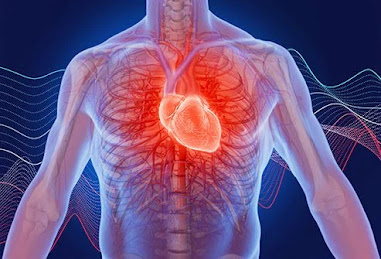Heart palpitations: What causes the heart to skip a beat?
Heart palpitations: What causes the heart to skip a beat?
Heart palpitations are pulses that abruptly become more recognizable. Once in a while they can feel like the heart has skirted a thump.
Palpitations can feel like the heart is beating, rippling, or pulsating sporadically. An individual might encounter these sensations in the throat or the neck.
Heart palpitations can feel alarming, particularly when individuals experience them interestingly. They might be nothing to stress over except for can require clinical consideration at times and a specialist ought to survey them.
What are heart palpitations?
A heart palpitation happens when somebody becomes mindful of their pulse, which might feel excessively quick, slow, or unpredictable. The heart siphons blood naturally, so individuals may as a rule know nothing about individual pulsates.
This siphoning permits the blood to course all through the body, conveying oxygen and other fundamental parts. The heart has four chambers connected with one-way valves.
A heartbeat is a siphoning activity that occurs in two sections:
Section 1: As blood gathers in the upper two chambers, an electrical sign causes a withdrawal that pushes blood to the lower chambers.
Section 2: One side of the heart pushes blood to the lungs, where it blends in with oxygen, and the opposite side flows oxygenated blood around the body.
The following is an intelligent liveliness of a commonplace heartbeat.
Investigate the activity with your mouse cushion or touchscreen.
What causes heart palpitations?
The heart skirting a thump can be the consequence of a few elements, including:
1. Way of life triggers
Difficult activity, lack of hydration, not getting sufficient rest, or drinking a lot of caffeine or liquor can leadTrusted Source to heart palpitations.
Smoking tobacco and utilizing unlawful medications, for example, cocaine or energizers, for example, Sudafed can likewise make the heart skirt a thump.
2. Mental or close to home triggers
Compelling feelings, for example, stress or uneasiness can cause heart palpitations.
They may likewise happen during a fit of anxiety. Different side effects of a fit of anxiety include:
queasiness
feeling frail or discombobulated
deadness in the furthest points
chest torment or snugness
shudder
windedness
3. Prescription
A few meds can set off heart palpitations. These include:
- asthma meds
- prescriptions for hypertension
- allergy medicines
- anti-toxins
- antidepressants
- antifungal prescriptions
Anybody who has regular heart palpitations and is taking medicine ought to really look at the rundown of conceivable aftereffects on the name. An individual should converse with a specialist prior to halting any prescription. Heart palpitations might be an innocuous incidental effect, yet it is ideal to check.
4. Chemical changes
Periods, pregnancy, and menopause can all cause hormonal changes, which might prompt heart palpitations.
An overactive thyroid can likewise cause heart palpitations.
5. Arrhythmias
Arrhythmias are changes in the typical example of electrical motivations from the heart, causing sporadic pulses. A few arrhythmias are innocuous, however others can be seriousTrusted Source and require clinical consideration.
Coming up next are instances of arrhythmias:
Atrial fibrillation: Can cause a quick, sporadic pulse and increment the gamble of stroke.
Bradycardia: A sluggish pulse.
Tachycardia: A quick pulse.
Supraventricular tachycardia: A quick heartbeat that can cause dazedness.
Ventricular tachycardia: A possibly difficult condition that causes a quick, standard heart beat and is once in a while related with unsteadiness or power outages.
6. Heart conditions
At times, palpitations can show issues with the heart. Models include:
Mitral valve prolapse: Which makes blood stream wastefully through the heart.
Cardiovascular breakdown: This happens when the heart can't siphon blood successfully, and heart chambers can widen.
Hypertrophic cardiomyopathy: Refers to an augmentation of the heart muscle and its walls.
Intrinsic coronary illness: Refers to irregularities that are available from birth.
7. Other ailments
The accompanying issues can likewise cause palpitations:
- weakness
- hypoglycemia, which alludes to low glucose levels
- low pulse
- thyroid tempest
- electrolyte irregularities
- Side effects of heart palpitations
Heart palpitations will more often than not feel like a rippling or beating in the chest or neck, or can feel like an unpredictable sensation in the chest.
At the point when more serious arrhythmias are mindful, palpitations can happen with the accompanying side effects:
- dazedness
- dazedness
- swooning
- disarray
- windedness or trouble relaxing
- chest agony or snugness
An individual will require prompt clinical consideration on the off chance that they experience these side effects close by heart palpitations. In outrageous cases, heart palpitations can prompt abrupt heart failure.
When to see a specialist
On the off chance that heart palpitations happen seldom, last under 30 seconds, and pass rapidly, an individual can intently screen them.
It is smart to talk with a specialist when palpitations:
- follow a background marked by heart issues
- keep going for significant stretches
- try not to work on over the long haul
- deteriorate
- are related with side effects like discombobulation, close swooning, blacking out, chest agony, or windedness
A few cases require crisis clinical consideration. An individual ought to look for clinical assistance quickly when palpitations go with any of these side effects:
- extreme windedness
- goog_924285833agony or snugness in the chest
- wooziness or tipsiness
- swooning or passing out
- Determination
To research the reason for heart palpitations, a specialist will typically get some information about an individual's side effects and clinical history. They may likewise suggest blood tests and an electrocardiogram (ECG) to actually look at the heartbeat.
An ECG is a straightforward test to really take a look at the heart's electrical action. A specialist will put little terminals onto the body that interface with an ECG machine with wires. This test can assist a specialist with perceiving how the heart is working.
On the off chance that the specialist thinks a heart issue or an arrhythmia, they might ask for:
Holter checking
Likewise called a constant wandering electrocardiographic screen, this is the point at which an individual wears a Holter screen for 24-48 hours or as long as 14 days to record the heart's mood.
Dive more deeply into Holter checking here.
Treadmill testing
Exercise or stress tests might set off a palpitation so a specialist can analyze it. An individual will typically walk and run on a treadmill or ride an exercise bike while a specialist screens pulse and beat.
Look into treadmill testing here.
Echocardiogram
An echocardiogram is a ultrasound that utilizations sound waves to make a picture of the heart's size, construction, and movements.
The sound waves reverberation off the heart, which a specialist can decipher through a PC to see pictures of the heart construction and valves.
An echocardiogram is an effortless method like a pregnancy ultrasound.
Chest X-beam
A chest X-beam is another indicative device specialists might use to check how the heart functions. A chest X-beam can show the heart structure and any progressions to the lungs that might result from a heart issue.
A X-beam is an easy methodology wherein the X-beam ignores the chest region.
Blood tests
A specialist can utilize different blood tests to assist with diagnosing heart palpitations, including:
- Full blood count (FBC): This test estimates the degrees of various pieces of the blood, like red platelets. It can show in the event that an individual has a disease or confusion, for example, frailty, which can cause heart palpitations.
- Thyroid capability tests: This test shows on the off chance that an individual's thyroid organ is making strange levels of the chemical thyroxine. Strange levels are related with heart palpitations.
- Urea and Electrolytes (Us and Es): This test estimates significant synthetic substances tracked down in the blood, including electrolytes like potassium and sodium. These assistance to balance out heart cadence.
- A blood test includes a specialist taking a little example of blood for testing in a lab. A clinical expert embeds a needle into an individual's vein through the skin to gather the blood. The individual might feel a slight sharp pricking sensation, however the strategy isn't ordinarily excruciating.
Treatment for heart palpitations
Treatment will rely upon the reason for the palpitations. At the point when way of life factors, for example, inordinate liquor or caffeine utilization are capable, an individual can do whatever it takes to stay away from those triggers.
Individuals with palpitations because of stress, uneasiness, or fits of anxiety might profit from picking up breathing activities and stress-the board strategies, like yoga and contemplation. It might likewise be smart to talk with a specialist.
A few arrhythmias are innocuous and don't need treatment. Notwithstanding, others might be clinically huge and require long haul drug.
An individual with an analyzed heart condition, for example, cardiovascular breakdown, will for the most part have to follow a treatment plan that incorporates way of life changes and drug.
While not every person with an innate heart deformity will require treatment, some might require a medical procedure or cardiovascular catheterization.
Way of life changes
Way of life changes, for example, eating a solid, adjusted diet can help promoteTrusted Source heart wellbeing. Individuals can eat an eating regimen that incorporates:
a scope of products of the soil
entire grains
vegetables, nuts, and seeds
fish and fish
Also, individuals can limit or keep away from:
- handled or seared food sources
- added sugars
- overabundance salt
- red meat
- liquor
- smoking
Keeping genuinely dynamic, keeping a solid weight, and controlling pulse and cholesterol are significant elements in overseeing heart conditions.
Different medicines
Other treatment choices can include:
prescriptions
- a pacemaker — a gadget that invigorates an ordinary heartbeat
- an implantable cardiovascular defibrillator — a gadget that screens and remedies an unpredictable heart beat
- gentle electrical shock — a technique to return the heart to its typical beat
- heart medical procedure to eliminate any part of the heart that isn't working true to form
- Outline
- Heart palpitations are a typical condition and commonly not a reason to worry. In any case, some of the time a more difficult condition causes them and they require clinical consideration.
Reasons for heart palpitations incorporate way of life triggers, for example, drinking liquor, smoking, ingesting unlawful medications, not getting sufficient rest, and arduous activity. They may likewise happen because of mental triggers, hormonal changes, and certain drugs.
A few palpitations might show a fundamental heart condition like an arrhythmia or cardiovascular breakdown. An individual ought to talk with a clinical expert right away in the event that they experience windedness, torment or snugness in the chest, or passing out.



Comments
Post a Comment